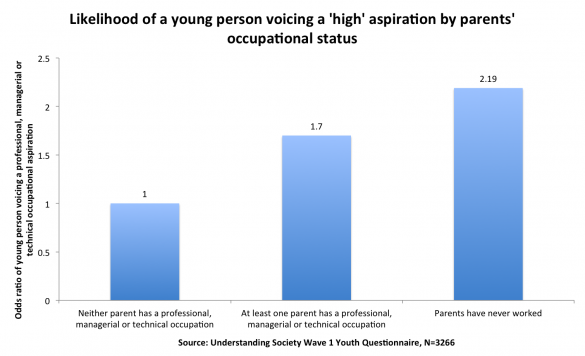My spatial analysis of young people’s occupational aspirations, using data from the Understanding Society dataset, reveals a surprising result that directly questions the current policy discourse which puts forward an intergenerational ‘culture of worklessness’ as an explanation for youth unemployment.
My analysis shows that even when a variety of individual- and household-level factors are accounted for (such as household income, parental qualifications, gender, ethnicity, and area-level deprivation), young people whose parents have never worked are the most likely to voice ‘high’ aspirations for professional, managerial or technical (PMT) occupations. Compared to young people whose parents work in non-PMT occupations, those with parents in PMT occupations are 70% more likely to voice a PMT aspiration. However, young people whose parents have never worked are more than twice as likely to voice a high aspiration.

This supports the findings of a recent JRF report, which finds little evidence that an intergenerational ‘culture of worklessness’ is a good explanation of unemployment. It also corroborates the findings of a 2013 paper by Ralf St. Clair and colleagues, which “challenge the idea that people growing up in low employment areas tend to reproduce what they see around them” (2013: 9). Likewise, my fieldwork with young people in Wythenshawe revealed that young people whose home backgrounds were most marked by material hardship – unemployment, low pay, and benefit dependency – were the most likely to prioritise good pay and job security when talking about their occupational aspirations. As one of my participants explained:
“Near enough every single person I know that lives round here, their mum’s on benefits and they don’t work. And if they do work they’ve not got money to give out to their sons and that, because they’re too busy paying the rent on the house. You don’t get nowhere, you’re just about surviving. My mum struggles to even survive. And I don’t want that life for my kids.”
Perhaps, then, the finding that young people whose parents have never worked are the most likely to have ‘high’ aspirations for professional, managerial and technical occupations, isn’t that surprising at all. Far from reproducing what they see around them, young people from disadvantaged backgrounds appear to be motivated by their context not to replicate the material conditions their parents have lived with. The challenge is to work with these young people to ensure they achieve the qualifications, information and guidance they need to turn these aspirations into reality.